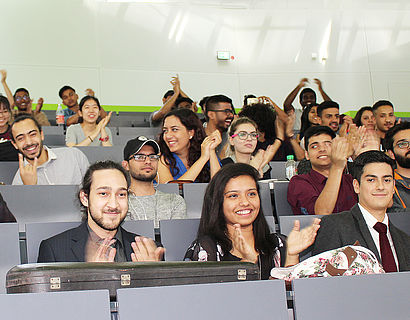Welcome
Graduates of the Bachelor's degree program in Business Administration have solid specialist skills in a business context, as well as professionally relevant personal and social skills. Throughout the course of your studies, you will acquire the knowledge and skills to work successfully in interdisciplinary contexts and team formations.
A semester abroad is optional and is supported by TH Wildau's extensive network of partner institutions.
The Bachelor's program forms the basis for subsequent Master's programs.
Key facts
|
Degree |
Bachelor of Arts (B.A.) |
|---|---|
|
Modes of Study |
extra-occupational degree programme, (full-time, part-time) |
|
Study Programme Duration |
8 semester (extra-occupational degree programme), 6 semester (full-time), 12 semester (part-time) |
|
Language of Instruction |
German |
|
Programme Start |
winter semester (start in September) |
|
Application Deadlines |
|
|
ECTS-Credits |
180 CP |
|
Fees |
|
|
Special Features |
- |
|
Faculty |
|
Study objectives
As a graduate of the part-time Bachelor's degree programme in Business Administration, you will be able to apply basic economic theories and methods in a business context based on scientific knowledge. You will internalise specialised knowledge and have the knowledge to comprehend current developments and assess the value of knowledge sources. By choosing specialisations, you have the opportunity to pursue individual study and career paths by deepening your studies in different areas of focus and expanding them to include non-subject-specific or interdisciplinary competences.
Study organisation
The part-time business studies programme usually takes place on 12 Saturdays and one block week per semester. The study times on Saturdays are usually scheduled from 8-15 hrs in the present study programme. The block week takes place in the winter semester in January and in the summer semester in July. In consultation with the employer, educational leave can be taken in part or in full for the block weeks. In addition to the classroom sessions on Saturdays and in the block week, the part-time study programme includes a higher proportion of self-study.
Study content
1. basic studies
At the beginning of your studies, you will receive a solid knowledge base of business administration-relevant areas such as general business administration, accounting, marketing, finance, law, business mathematics and IT in the first five semesters. You will receive an introduction to scientific work and various learning techniques to help you get started in your studies.
1st semesterOpen areaClose area
|
Scope in credit points |
|
|---|---|
|
Introduction to business administration |
5 |
|
External Accounting |
5 |
|
Mathematics I |
5 |
|
Scientific work and learning techniques |
5 |
|
Business Computing I: Fundamentals |
5 |
|
Total |
25 |
2nd semesterOpen areaClose area
|
Scope in credit points |
|
|---|---|
|
Cost and performance accounting |
5 |
|
Introduction to Economics I |
5 |
|
Mathematics II and Statistics I |
5 |
|
Business English I |
3 |
|
Reflection and Professionalisation |
2 |
|
Total |
20 |
3rd semesterOpen areaClose area
|
Scope in credit points |
|
|---|---|
|
Introduction to law |
5 |
|
Annual accounts and business taxes |
5 |
|
Production and logistics |
5 |
|
Marketing |
3 |
|
Project management |
2 |
|
Business English II |
5 |
|
Total |
25 |
4th semesterOpen areaClose area
|
Scope in credit points |
|
|---|---|
|
Investment and Financing |
5 |
|
Introduction to Economics II |
2 |
|
Statistics II |
3 |
|
Business Computing II: ERP Systems |
5 |
|
Compulsory electives - small catalogue |
5 |
|
Total |
20 |
5th semesterOpen areaClose area
|
Scope in credit points |
|
|---|---|
|
Operational interface management |
5 |
|
Compulsory elective - large catalogue |
5 |
|
Practical work |
15 |
|
Total |
25 |
2. Advanced studies
In addition to a few fixed modules, you have the opportunity to specialise in the 6th and 7th semesters. Two specialisations are available for this degree programme, which are offered on Saturdays. In addition, it is also possible to choose specialisations from the direct studies. You can find an overview of the specialisation options here.
6th semesterOpen areaClose area
|
Module |
Credit Points |
|---|---|
|
Team Development and Team Coaching I |
2 |
|
Specialisation I - Module I |
5 |
|
Specialisation I - Module II |
5 |
|
Specialisation II - Module I |
5 |
|
Specialisation II - Module II |
5 |
|
Sum |
22 |
7th semesterOpen areaClose area
|
Module |
Credit Points |
|---|---|
|
Team Development and Team Coaching II |
3 |
|
Specialisation I - Module III |
5 |
|
Specialisation I - Module IV |
5 |
|
Specialisation II - Module III |
5 |
|
Specialisation II - Module IV |
5 |
|
Total |
23 |
Overview of specialisations in the 6th and 7th semestersOpen areaClose area
Specialisation: Management consultancy
Management consultants are external service providers who are purchased on a project
by companies or public authorities on a project basis. What is important here is
quick comprehension and methodical skills are important.
In this specialisation, methodological knowledge is imparted and these skills are practised.
these skills are practised.
Offered in the study programme: Business Computing
Can be selected in the degree programmes: BWL, EBM, BFG
Specialisation: Data Engineering
Data is the most important resource of our time. Data Engineers
understand data-driven systems and can use them. In
this specialisation, the fundamentals are taught and
modern systems.
Offered in the: Business Computing degree programme
Specialisation: Software Development
Software drives the world and, of course, companies as well.
Professional software developers need more than
programming basics. In this specialisation
theoretical foundations, methodological knowledge and modern
technologies for software developers.
Offered in the: Business Computing degree programme
End-of-study phase
In the final section of your Bachelor's degree, you will acquire competencies in leadership and communication. You will also be introduced to empirical research methods. Finally, the completion of your thesis is the culmination of your studies.
8th semesterOpen areaClose area
|
Module |
Extent in Credit Points |
|---|---|
|
Leadership and Communication |
5 |
|
Empirical research methods |
3 |
|
Bachelor thesis |
12 |
|
Total |
30 |
Career prospects
Studying business administration offers a wide range of career prospects. Depending on your chosen specialisation, there are prospects, for example, as a
- Financial analyst
- Controller
- Marketing manager
- human resources manager
- in tax consultancy or
- executive employee/managerial employee.
Due to sound business management knowledge, all paths to self-employment are also open to you.
Preparation courses
We recommend checking in good time as to whether it is useful for you to participate in study preparation courses prior to commencing your studies. Online tests in the subjects of mathematics, physics, information technology and technical mechanics will help you come to a decision. Prior knowledge in these subjects is an important basis for various study modules and therefore necessary for the success of your studies in light of past experience.






